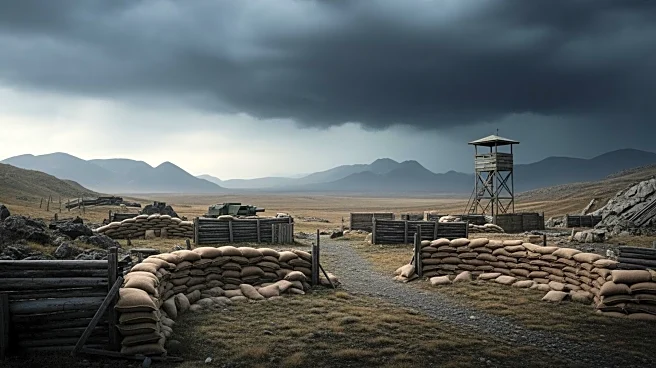What's Happening?
Ukrainian troops have retreated from positions near five settlements in Zaporizhzhia Oblast due to intense fighting with Russian forces. According to Vladyslav Voloshyn, spokesperson for Ukraine's Southern Defense Forces, the withdrawal includes Uspenivka
and Novomykolaivka, with fierce battles continuing in Yablukove and other locations. The situation has worsened as Russian troops exploit dense fog to infiltrate Ukrainian positions, aiming to cut off supply routes. Commander-in-Chief Oleksandr Syrskyi confirmed that Russian forces have captured three settlements, increasing their activity in the region. Despite these challenges, the regional capital, Zaporizhzhia, remains under Ukrainian control.
Why It's Important?
The withdrawal of Ukrainian forces from key positions in Zaporizhzhia Oblast signifies a strategic shift in the ongoing conflict, highlighting the challenges faced by Ukraine in maintaining territorial control. The Russian advances threaten to disrupt supply lines and further destabilize the region, potentially impacting civilian safety and infrastructure. This development underscores the broader geopolitical tensions and the resilience required by Ukrainian forces to adapt to adverse conditions. The situation could influence international diplomatic efforts and military support for Ukraine, as well as affect regional security dynamics.
What's Next?
As Russian forces continue their advance, Ukrainian military strategies may need to adapt to counter the infiltration tactics and regain lost ground. The focus will likely be on fortifying remaining positions and securing supply routes to prevent further encirclement. International stakeholders, including NATO and EU countries, may increase support to bolster Ukraine's defenses. The ongoing conflict could lead to heightened diplomatic engagements aimed at de-escalation and peace negotiations. Monitoring developments in Zaporizhzhia and neighboring oblasts will be crucial for assessing the conflict's trajectory.
Beyond the Headlines
The use of weather conditions by Russian forces to gain tactical advantages raises ethical questions about warfare strategies. The impact on civilian populations in affected areas, including potential displacement and humanitarian needs, requires attention from international aid organizations. Long-term implications may include shifts in regional alliances and increased military presence by foreign powers. The conflict's progression could also influence global energy markets, given the strategic importance of Ukraine's infrastructure.
















